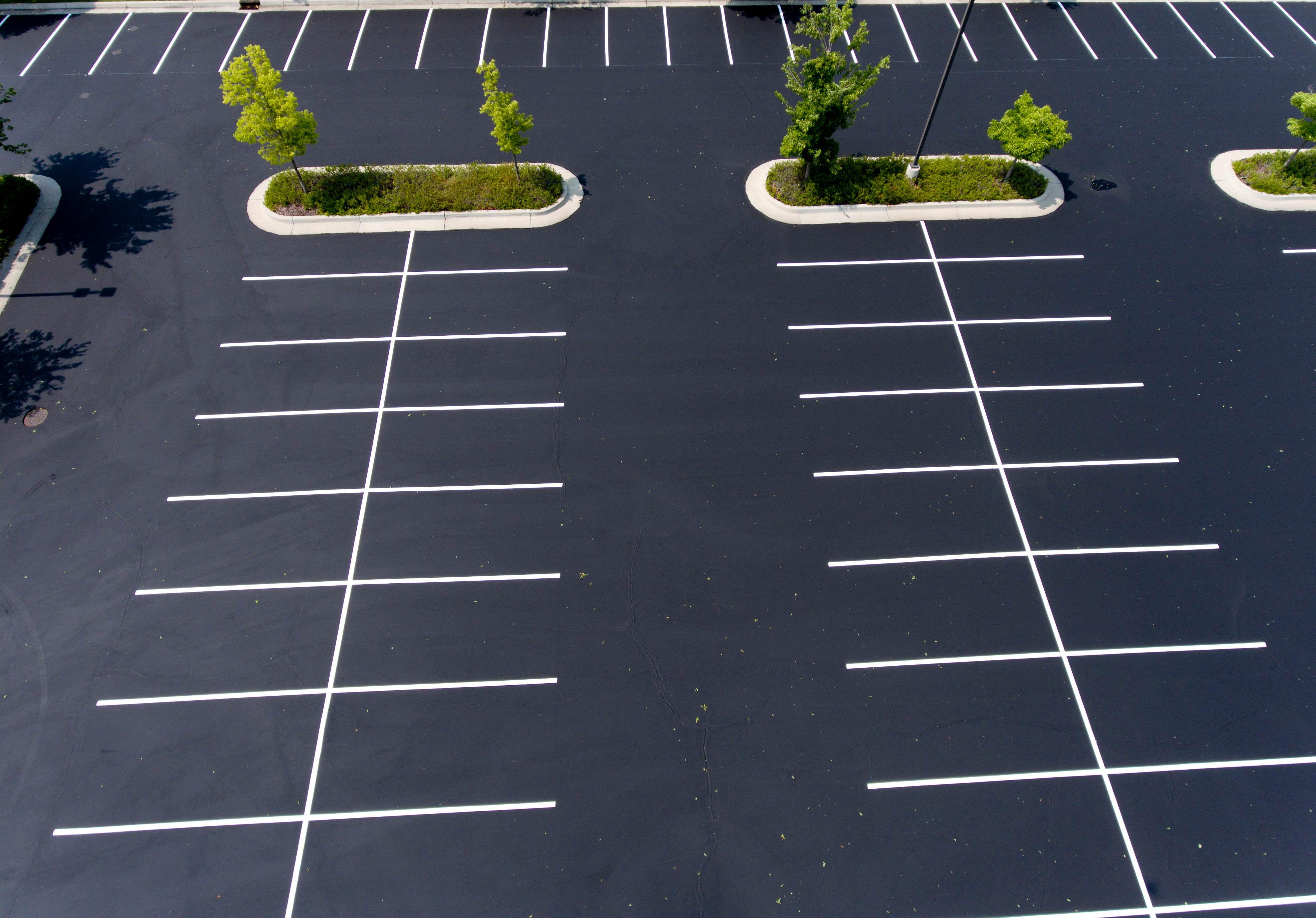Whether you’re a property owner replacing an existing parking lot or a homeowner repairing a driveway, one of the first decisions you must make is choosing between asphalt and concrete as your pavement materials. When it comes to asphalt vs. concrete cost, several factors impact pricing.
Below we’ll compare asphalt and concrete pricing for parking lots and driveways so you can make an informed decision that fits within your budget and needs.
Asphalt vs. Concrete: What’s the Difference?
Before breaking down the asphalt vs. concrete cost, we’ll briefly explain both materials. Understanding the differences between asphalt vs. concrete will demonstrate how it impacts their pricing.
The main differentiator between asphalt and concrete is the binding agent used to hold the aggregate (crushed sand) together. Asphalt uses a petroleum-based binder, while concrete is bound by cement. Although concrete and asphalt have similar materials, the costs can differ based on driveways and parking lots.
Below we’ll break down the differences in pricing for asphalt services and concrete so you can decide which is best for your property or home.
Asphalt vs. Concrete Cost: Pricing Factors
Property and homeowners commonly ask, “Is asphalt cheaper than concrete?” On average, asphalt costs $6-8/per square foot, while concrete can cost up to $12-15/per square foot. In addition to square footage costs, other factors impact pricing. Below we’ll break down the cost of asphalt vs. concrete for parking lots and driveways.
Asphalt vs. Concrete Cost for Parking Lots
So, which is cheaper: asphalt or concrete? When it comes to larger parking lots, asphalt is often the more cost-effective choice. It not only costs less upfront but also offers several practical advantages that make it a better long-term investment for many property owners.
Here are a few reasons why asphalt may be the better option for parking lots:
- Faster curing times, meaning the parking lot can reopen sooner and cause less disruption to your business or property use.
- Lower cost per square foot, especially when paving larger areas, making it a more budget-friendly option.
- Better resilience to sudden temperature changes, particularly in colder climates, helping asphalt surfaces withstand cracking and other damage with fewer repairs.
- Simpler and less expensive repairs, allowing you to maintain the lot more easily and affordably over time.
Concrete for parking lots can be considered if your region doesn’t have extreme weather conditions (too hot or cold) or if you can’t commit to regular asphalt maintenance. Since concrete lasts longer than asphalt, this may be a better option for commercial districts that want to worry less about parking lot maintenance.
| Asphalt Parking Lots | Concrete Parking Lots |
| 24-48 hours to cure | One week to cure |
| Ongoing maintenance required | Less ongoing maintenance required |
| Easier and cheaper repairs | Complex and costly repairs |
| $6-8/ sq ft | $12-15/ sq ft |
| Less parking lot closure times | Longer parking lot closure times |
However, concrete takes over a week to cure while asphalt takes only 24-48 hours – so parking lot closure times will be prolonged for commercial property owners choosing this option.
Concrete vs. Asphalt Driveway Cost
Regarding asphalt vs. concrete driveway cost, concrete can be considered an ideal option for homeowners.
Here are some reasons why concrete can be more cost-effective for driveways than asphalt:
- Less ongoing maintenance is required because it lasts up to 50 years
- Smaller areas, so the higher per square footage costs are less impactful
- Driveways have less traffic weight and volume than parking lots, causing faster deterioration and less frequent repair costs
- Personalized, cleaner look, and has sharper edges
Asphalt driveways can be considered because they’re cheaper upfront, easier to install, and less expensive to repair. Concrete is more costly upfront, has a more complex installation, and is harder to repair — which can be more financially challenging for homeowners.
| Asphalt Driveways | Concrete Driveways |
| Lower upfront costs | Higher upfront costs |
| Lasts 3-5 years with ongoing maintenance | Lasts up to 50 years with no maintenance |
| Easier application and cheaper repairs | Complex application and costly repairs |
| No access to driveways for 24-48 hours | No access to driveways for a week |
Although asphalt requires more ongoing maintenance than concrete, it takes only 24-48 hours to cure, while concrete takes a week. If you’re a homeowner living in a metropolitan area with limited public parking, concrete may not be the best option for your driveway.
Revitalize Your Parking Lot or Driveway Asphalt with Superior Asphalt
Now that you know the factors that impact asphalt vs. concrete cost and their material differences, you can decide what’s best for your home or parking lot. At Superior Asphalt, we offer asphalt maintenance services for home and property owners to keep your pavement in top shape.
Contact us for pricing, asphalt repairs, or questions about your asphalt parking lot or driveway today!


